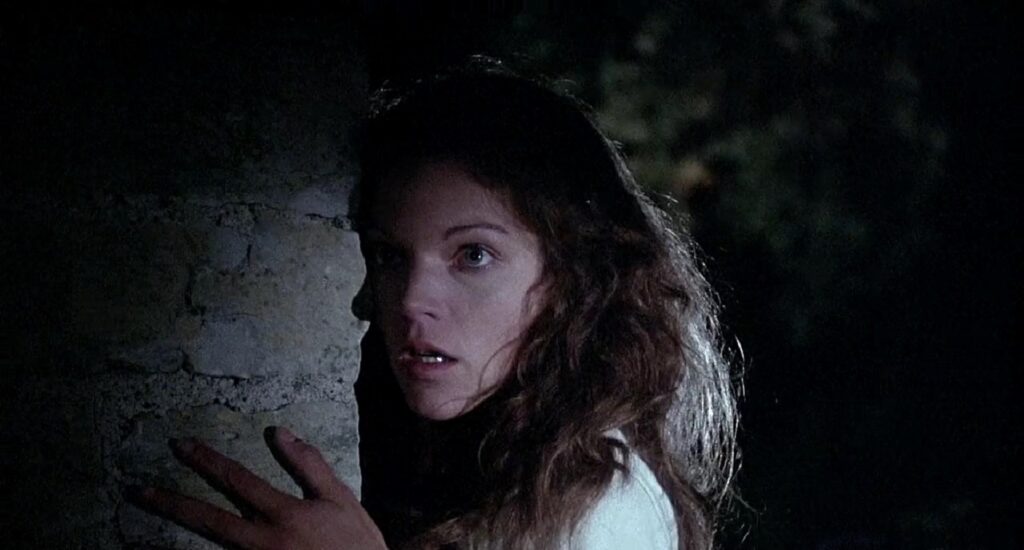
Brian De Palma’s follow up to Carrie (1976) was The Fury (1978), a film that is at once both the last breath of the classic Hollywood star persona (Kirk Douglas) and a decidedly post-modern thriller. The Fury exploits the gifts of its star Kirk Douglas more effectively than any film the actor had made in fifteen years all while being a bit of everything Brian De Palma had become known for. The Fury is a macabre supernatural thriller that plays with political conspiracies and fractured family units equally.
The power of The Fury rests with the fact that the film is so many things at once. De Palma embraces the multitude of genre idiosyncrasies as a means of pushing the audience’s acceptance of his illusions. These illusions, born out of an expert cinematographic craft, revolve around the suspicions with which viewers began to approach government institutions in the wake of Vietnam and Watergate. In The Fury duplicity, disguises, assassinations, extortion, and espionage are the bread and butter of adventure.
There’s a fractured tonality to The Fury inherent to such an exercise. But at its heart is the burgeoning powers of Gillian (Amy Irving) and the paternal optimism of Peter Sandza (Kirk Douglas). The political corruption of Childress (John Cassavetes) pulls asunder the Sandza family unit, effectively taking political scandals like Watergate into the intimate spheres of family life. Similarly, the gradual annihilation of Gillian’s autonomy at Childress’ orders reveals the erosion of the individual in a society moving closer and closer towards conservatism.
Gillian’s telekinetic powers are a reprisal of the metaphor central to De Palma’s Carrie. At the same time the institute run by Dr. McKeever (Charles Durning) predicts the supernatural soap opera of Chris Claremont’s New Mutants. The exploration of youth as change and political resistance juxtaposes the political regressions and machismo of the masculine counterpart Kirk Douglas. It is only when the macho hero of yesteryear allies himself with the heroine of tomorrow that the quasi-fascism of the J. Edgar Hoover-esque Childress can be challenged.
Structurally, The Fury moves in manic fits from Gillian’s plot to Peter’s until their journey becomes unified in one of De Palma’s most impressive action set pieces. Ostensibly Carrie is moving on a parallel track to a spy thriller that Jon Rubin would have read in Greetings (1968) until the two intersect to reveal that the fantasies offered by either narrative tradition are, philosophically, one and the same.
Peter and Gillian are a dichotomy that represents the singular outsider that has been at the heart of De Palma’s earlier films Hi, Mom! (1970), Phantom Of The Paradise (1974) and Obsession (1976). Peter’s profession and Gillian’s gifts keep them on the fringes of society; a position where their subversions, in plot and aesthetics, are most effective. Only in a film as dedicated to its own fractured nature could Kirk Douglas’s old man disguise work as an extension of the illusion of the character rather than as some form of self-parody.
De Palma’s gift for sincerity in his camp is among the legendary filmmaker’s most undervalued but essential qualities. Douglas hams it up but never loses sight of his emotional motivation in the same way that De Palma clearly realizes the absurdity of The Fury but will not deny its ability to engage in the primal truths of parental love and teenaged angst. This dramatic weight is externalized in the scenes where the ever committed performer John Cassavetes appears as the checks and balances to Douglas and De Palma.
The Fury is one of the great post-modernist genre mash-ups Hollywood ever produced and one of De Palma’s greatest entertainments. The Fury does so much with the horror, thriller and adventure genres in a single film that it almost registers as a kind of reflexive satire of the saccharine post-modernist spectacles on offer from De Palma’s pals Steven Spielberg and George Lucas. Where they aim for sentimental escapism, De Palma delivers a pulpy sensory overload. In that respect The Fury predicts the Hollywood extravaganzas of Paul Verhoeven and the anti-blockbuster hits of the late eighties.
